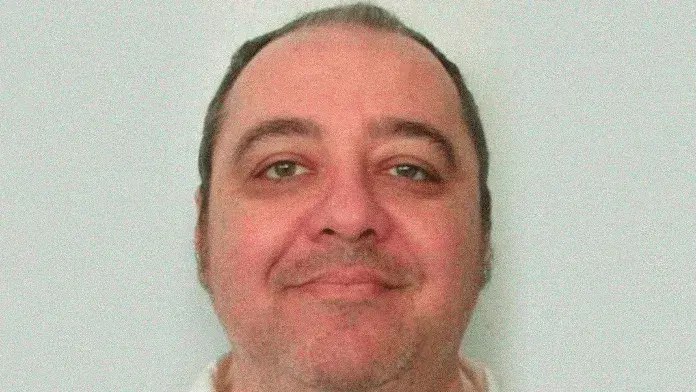Once the nitrogen gas was turned on, the death took several minutes longer than expected.

On Thursday, Alabama put to death Kenneth Smith, a convicted killer, in a first ever execution using nitrogen gas.
This was the first time that this new execution method was used in the U.S. since the introduction of lethal injections 40 years ago.
Smith, who was found guilty of a 1988 contract killing, had already escaped one execution attempt. In November 2022, Alabama officials called off his execution by lethal injection after failing for hours to insert a needle into his vein.
The state claimed that its new protocol, which was closely monitored, was “the most painless and humane method of execution known to man.”
It expected Smith to lose consciousness in less than a minute and die shortly after, but witnesses on Thursday said it seemed to take longer.
Alabama praised asphyxiation as a simpler option to use when there is difficulty finding either veins or the necessary drugs for lethal injections.
Human rights groups, U.N. torture experts and Smith’s lawyers tried to stop it, arguing that the method was risky, experimental and could result in a painful death or serious injury.
On Thursday, Smith made his second and last visit to the execution chamber, where he was secured to a gurney and fitted with a commercial industrial-safety respirator mask. A canister of pure nitrogen was connected to the mask that, once turned on, cut off his oxygen supply.
The execution started at 7:53 p.m. (0153 GMT Friday) and Smith was pronounced dead at 8:25 p.m. (0225 GMT), according to prison officials.
Smith seemed to stay conscious for several minutes after the nitrogen was activated, as reported by five journalists who were allowed to witness the execution through glass. He then started to shake his head and twist for about two minutes, and then could be seen taking deep breaths for several minutes before his breathing slowed down and became invisible, the witnesses said.
“It appeared that Smith was holding his breath as long as he could,” Alabama Corrections Commissioner John Hamm said at a press conference. “He struggled against the restraints a little bit but it’s an involuntary movement and some agonal breathing. So that was all expected.”
Rev. Jeff Hood, Smith’s spiritual adviser, was with Smith for the execution, and said prison officials in the room “were visibly surprised at how bad this thing went.””What we saw was minutes of someone struggling for his life,” Hood, who had attended his fifth execution in the last 15 months, told reporters.
“We saw minutes of someone heaving back and forth. We saw spit. We saw all sorts of stuff from his mouth develop on the mask. We saw this mask tied to the gurney, and him ripping his head forward over and over and over again.”
Before the nitrogen was turned on, Smith made a long final statement that started with: “Tonight, Alabama caused humanity to take a step backward.” His wife and other relatives were present and he gestured towards them. “I’m leaving with love, peace and light,” he said, according to media witnesses. “Love all of you.”
Smith fought in federal courts to stop his execution, claiming that Alabama’s new method was an unconstitutional “cruel and unusual punishment,” but he could not meet the high standard required to have a judge postpone his death.
His lawyers worried that the mask would not fit tightly on Smith’s face, letting oxygen in, which could delay or prevent him from losing consciousness but also cause severe brain damage.
Although lethal gases such as hydrogen cyanide have been used for executions in the U.S. and elsewhere before, this was the first time that an inert gas was used to suffocate someone as a punishment, according to experts on capital punishment.
Oklahoma and Mississippi have also authorized nitrogen asphyxiation methods for executions, but have not used them yet.
Smith, who had been nauseous since he survived his first execution attempt, also expressed fears that he would throw up into the mask and choke. In response, prison officials said they would give him his last meal on Thursday morning and ban any solid foods after 10 a.m. His last meal was steak, hash browns and eggs.
The U.S. Supreme Court’s conservative majority denied Smith’s last appeal to delay his death on Thursday evening, and the execution started shortly after.
“On March 18, 1988, Kenneth Eugene Smith brutally killed 45-year-old Elizabeth Sennett,” Alabama Governor Kay Ivey, a Republican, said in a statement. “After more than 30 years and attempt after attempt to manipulate the system, Mr. Smith has paid for his terrible crimes.”
Smith was found guilty of killing Sennett, a preacher’s wife, after he and his partners each received a $1,000 payment from her husband to murder her, according to trial testimony. Eleven of 12 jurors voted to sentence Smith to life in prison, but an Alabama judge overruled their decision under a law that has since been ruled unconstitutional.
Some of Sennett’s relatives were present at the execution and told reporters they had forgiven Sennett’s murderers. “Nothing that happened here today is going to bring mom back,” Mike Sennett said. “It’s a bittersweet day, we’re not going to be jumping around, hooping and hollering, hooraying and all that, that’s not us. We’re glad this day is over.”







